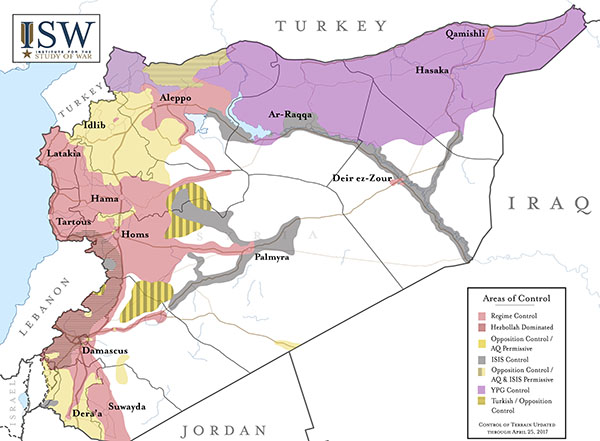America’s relationship with Turkey has entered a period of deep crisis. At the heart of the matter is continued U.S. support for Syrian Kurds fighting the Islamic State. The partnership between the United States and a coalition of Kurdish People’s Protection Units (YPG) and Syrian Arab militias, currently known as the Syrian Democratic Forces (SDF), began more than two years ago under President Barack Obama. President Donald Trump’s administration continues to back the 50,000-strong SDF as the most capable anti-Islamic State force in northern Syria. The SDF are now closing in on Raqqa, the capital of the Islamic State’s self-described caliphate, and Trump has approved a plan to provide arms directly to the YPG for the final push. Yet Turkey sees the SDF as mortal enemies due to the YPG’s affiliation with the Kurdistan Worker’s Party (PKK), a designated terrorist organization which has fought a bloody insurgency inside Turkey for three decades. These clashing interests have put Washington and Ankara on a collision course just as the U.S.-led campaign to crush the caliphate enters its culminating phase.
Turkey’s concerns about the YPG are understandable and widely appreciated. What is less well known is the fact that it was Turkey’s own actions, in particular a set of decisions made by President Recep Tayyip Erdogan, that stymied joint U.S.-Turkey efforts to identify an alternative anti-Islamic State force. This pushed the United States and the YPG closer together and eventually created the SDF. And, with Raqqa in their sights, the Trump administration is unlikely to abandon them now.
In the closing days of the Obama administration, President Barack Obama was willing to increase training and assistance to the SDF, including YPG elements, for the final push on the Islamic State’s capital. But retired Lt. Gen. Michael Flynn, Trump’s incoming national security advisor, asked the administration to hold off so the new team could run its own review. (We now know that Flynn was paid to represent Turkish government interests prior to becoming national security advisor, although it is unclear whether that had any impact on the decision.)
After surveying the options, the Trump administration seems to have come to the same conclusion Obama did: the SDF represent the only viable force to seize Raqqa anytime soon. Nevertheless, the Trump administration decided to delay providing additional support to the SDF — especially armaments directly to the YPG — for months out of deference to the U.S.-Turkey alliance and Erdogan’s domestic politics. The hope appears to have been that waiting until after Turkey’s April 16 referendum on enhancing the power of the presidency would give Erdogan less incentive to whip up nationalist sentiment against the American plan. Following the narrow approval of the referendum consolidating Erdogan’s power, Trump even took the controversial step of calling Erdogan to congratulate him, most likely to make the bitter pill of the Raqqa operation easier to swallow. Erdogan was also invited to meet with Trump at the White House, a political boon to the Turkish president given rising international criticism over Turkey’s democratic backsliding.
The United States and Turkey Are on a Collision Course in Syria | Foreign Policy





